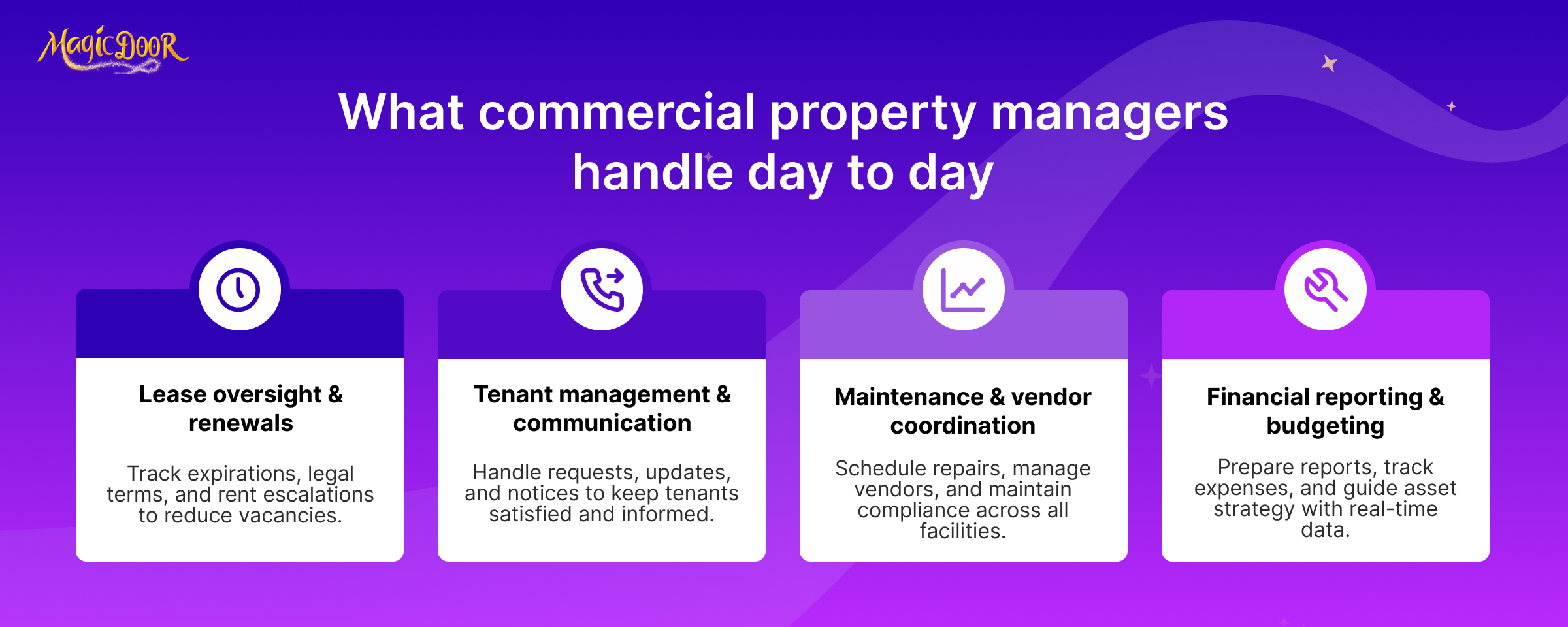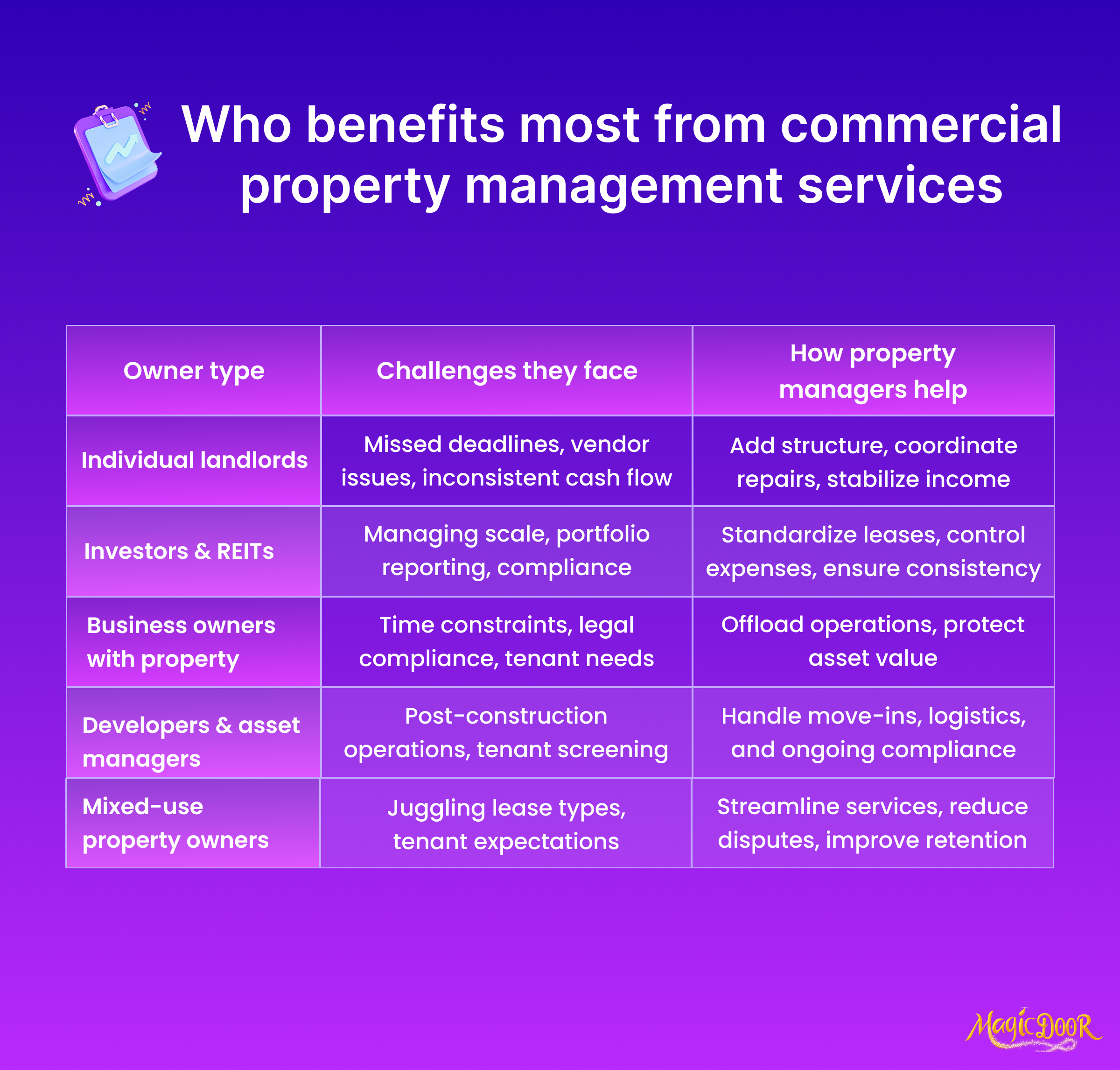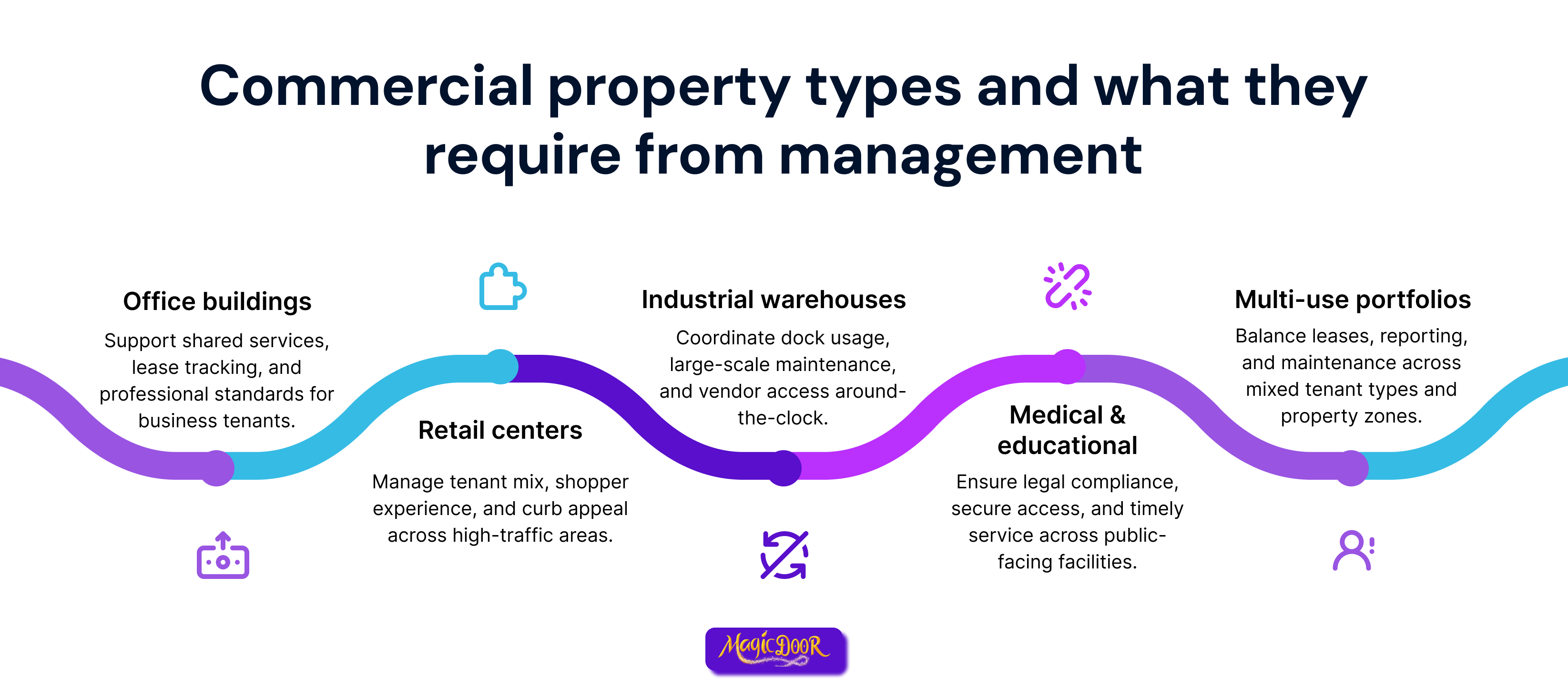Commercial property management is no longer just for large institutions.
Today, landlords, real estate investors, and owner-operators rely on professional support to keep assets profitable and tenants satisfied.
As lease terms grow more complex and tenant expectations rise, the demands of managing commercial real estate have changed. From collecting rent to coordinating service vendors across properties, success in 2025 depends on structured systems and informed decision-making.
This guide breaks down what commercial property managers actually do, who needs them, and why specialized support matters more than ever, especially for property managers who balance development with operational control.
What is Commercial Property Management?
Commercial property management refers to the professional oversight of non-residential spaces, such as office buildings, retail spaces, industrial facilities, and even sports complexes. A commercial property manager handles the daily operations, financial management, and tenant relations involved in managing commercial properties.
Far from residential property management, which centers on residential leases, commercial property management deals with complex commercial leases, longer contract terms, and higher tenant expectations.
Tasks go from rent collection and maintenance requests to lease renewals, tenant inquiries, and project management for property improvements.
A good property manager is responsible for protecting the property value, retaining quality tenants, and generating steady cash flow. This means staying compliant with building codes, federal laws, and relevant regulations while responding to tenant concerns promptly.
Commercial property management also demands extensive knowledge of market trends, legal compliance, and risk management.
What Does a Commercial Property Manager Do?

Commercial property managers are responsible for much more than day-to-day building operations.
Their work supports asset performance, safeguards tenant satisfaction, and allows property owners to focus on their core business.
In a property management company, the manager is often the operational lead for office properties, retail spaces, and industrial facilities. They're tasked with balancing financial management, regulatory oversight, and direct tenant relations while preserving the long-term financial health of the asset.
The role also requires expertise in commercial real estate market trends, relevant laws, and property maintenance planning.
Below, you'll find a breakdown of two major pillars of their responsibility.
Lease Oversight & Renewal Management
Every professional property manager must ensure that lease agreements are executed correctly, stored securely, and monitored for critical dates like renewals or rent escalations.
They review lease terms for accuracy, track compliance with legal requirements, and often support negotiating leases to protect the property owner’s financial interests.
To run effective commercial property management, the manager typically maintains a centralized system that tracks:
- Renewal deadlines and escalation clauses
- Tenant requests related to lease adjustments
- Legal conditions for extensions or termination
- Any building codes affecting lease compliance
Handling this process with precision allows them to minimize vacancies, avoid evictions, and maintain stable cash flow for the owner.
Commercial Tenant Management & Communication
Responding to tenant inquiries quickly and with the right tone is essential for keeping satisfied tenants long-term. Managers coordinate maintenance requests, share updates, and resolve complaints while balancing fairness with business priorities.
Depending on the asset's performance goals and location, a property management team may also help shape the ideal tenant mix. Communication often includes:
- Notices about property improvements or inspections
- Updates on maintenance costs and scheduled repairs
- Clarification on management fees or other fees
- Guidance on community rules, building access, and service expectations
Strong tenant management practices are key to retaining tenants, reducing turnover, and improving investment opportunities.
Maintenance, Vendors, & Facility Operations
Commercial property managers coordinate every aspect of property maintenance, from routine inspections to emergency repairs. Their oversight ensures that office properties, retail spaces, or sports facilities remain safe, functional, and compliant with all building codes.
They build relationships with local contractors, cleaning crews, HVAC technicians, and other vendors. Rather than simply reacting to problems, a skilled property management team implements preventive schedules and tracks vendor performance across multiple sites.
Typical responsibilities include:
- Approving vendor invoices and verifying completed work
- Ensuring service contracts align with budget and scope
- Scheduling compliance inspections or certifications
- Monitoring facilities to catch issues before they escalate
Facility operations also influence tenant retention. A well-maintained space contributes to higher satisfaction and fewer complaints, reducing turnover and stabilizing occupancy for the property owner.
Financial Reporting & Budgeting
One of the most critical areas of commercial property management is financial reporting. Stakeholders depend on accurate data to evaluate the asset’s financial health, adjust rent pricing, and find new investment opportunities.
Managers prepare monthly reports, track management and other fees, and oversee budgeting for maintenance costs, capital improvements, and reserve funds.
Tools like automated dashboards help them deliver timely updates to the real estate team and property ownership.
A well-run property management company typically delivers:
- Profit-and-loss statements for each commercial property
- Expense tracking broken down by service category
- Forecasts for repairs, vacancies, or lease renewals
- Budget-to-actual variance analysis for informed decision-making
With a firm understanding of cash flow and expense trends, property managers help ownership teams plan strategically and respond to market changes.
Who Needs Commercial Property Management Services?

Individual Commercial Landlords
An individual property owner managing a single commercial property or even a few office properties can quickly feel overwhelmed by leasing, repairs, and tenant coordination. Without a structured system, small landlords risk missed lease renewals, delayed property maintenance, and unstable cash flow.
A professional property manager provides continuity, handles building codes, and steps in when vendors fall short.
Even owners with basic portfolios benefit from:
- Clear communication with tenants
- Centralized financial management
- Proactive scheduling for inspections or repairs
Working with a qualified property management company reduces friction and protects long-term returns, whether overseeing tenant mix, tracking maintenance costs, or responding to legal compliance issues.
Real Estate Investors & REITs
Operational scale creates complexity for larger-scale players in commercial real estate.
Institutional investors and REITs rely on experienced property management firms to drive consistency across diverse holdings, whether downtown office towers or suburban retail spaces.
These managers act as partners, balancing performance targets with day-to-day execution. Services often include:
- Uniform lease oversight across multiple locations
- Vendor coordination and site-level reporting
- Asset-level forecasting and expense control
When portfolios grow, the need for detailed reporting, local compliance enforcement, and informed decisions multiplies. Working with a proven property management team helps preserve the asset’s financial health and uncover new investment opportunities without overpowering internal resources.
Business Owners With Property Holdings
Some business owners own the commercial property they operate from, such as warehouses, storefronts, or office properties. Managing these buildings while running the business itself can stretch internal resources thin.
If they lease space to other businesses, hiring a property management company helps offload operational demands while improving tenant retention.
Benefits include:
- Handling repairs, lease agreements, and service calls
- Staying compliant with local building codes
- Protecting the asset’s value through consistent oversight
Property Developers or Asset Managers
Once construction wraps, many property developers step into ownership or management roles, yet few want to handle maintenance coordination, tenant management, or rent collection.
That’s where experienced commercial property managers come in. They handle the transition from active development to stabilized operations.
With help from a specialized property management team, developers and asset managers can:
- Support occupancy efforts by screening potential tenants
- Manage move-ins, buildouts, and operating logistics
- Ensure full compliance with all safety and zoning laws
It’s also a strategic move. With day-to-day operations handled externally, teams gain time to focus on their next build or investment opportunity.
Mixed-Use & Multi-Tenant Building Owners
Properties with retail and residential units, or multiple business tenants, require coordination across very different needs. From dealing with residential leases to managing tenant mix in ground-floor storefronts, complexity is high.
Commercial property management brings order. A structured team streamlines everything from negotiating leases to handling eviction processes when required.
Key advantages include:
- Standardized service levels for all occupants
- Fewer disputes due to consistent rules and response times
- Stronger reputation among brokers and leasing agents
Owners who work with specialized property management firms reduce turnover, attract better tenants, and gain clarity in a sector where commercial property management differs significantly by building type.
What Types of Properties Require Commercial Management?

Office Buildings
Office properties demand consistent oversight to support tenant businesses and protect long-term asset value. From daily property management to lease coordination, these conditions leave little room for error.
A property management team ensures shared spaces, building systems, and lease schedules are all handled professionally. This includes:
- Coordinating HVAC and janitorial vendors
- Managing conference room access and parking policies
- Handling lease terms, renewals, and eviction processes when needed
Commercial property managers focus on uptime, responsiveness, and maintaining professional standards that align with the tenant’s operational needs. In competitive markets, strong property management is key to retaining high-value tenants and positioning commercial properties for sustained returns.
Retail Spaces & Shopping Centers
Retail environments have their own priorities, such as coordinating merchant schedules, maintaining curb appeal, and ensuring common areas support traffic and safety.
A skilled property manager’s responsibility includes responding to maintenance issues quickly and applying innovative solutions to improve tenant satisfaction and the shopper experience.
Management typically includes:
- Tracking lease expirations and collecting rent on time
- Balancing management fees with vendor quality
- Ensuring storefronts remain clean, safe, and inviting
It’s also essential to manage tenant mix in multi-tenant shopping centers, making sure businesses complement each other rather than compete directly.
Industrial Warehouses & Logistics Hubs
Industrial warehouses and logistics hubs require precise coordination to support round-the-clock activity. Whether last-mile delivery stations or large-scale storage centers, commercial property managers ensure operational continuity through systems that handle high traffic, strict timelines, and complex vendor setups.
A reliable property management team tracks inspections, security access, and emergency response protocols. Timely repairs and compliance with safety standards are not optional.
Core duties include:
- Overseeing truck access and dock usage policies
- Managing large-scale maintenance without disrupting operations
- Aligning lease terms with logistics cycles and seasonal volume
Medical & Educational Facilities
Managing medical clinics or school campuses involves distinct challenges. Beyond daily maintenance, there's the need to comply with strict health codes, accessibility laws, and service hour demands.
A property management company supporting these assets ensures:
- Secure access control for staff, patients, or students
- Responsive repairs that minimize health and safety risks
- Coordination with facility directors on long-term plans
Because these spaces serve the public, professionalism matters at every touchpoint. A property manager’s responsibility includes documenting maintenance logs and supporting legal compliance across departments.
With increasing demand for non-retail, service-based properties in the real estate industry, experienced managers are now essential to long-term success in these sectors.
Multi-Use Commercial Portfolios
Properties that include sports facilities, office space, and retail under one roof demand specialized attention. Stakeholder needs vary, and lease structures differ by unit, challenging standardized service.
Commercial property management in these contexts means managing multiple calendars, vendors, and operational risks simultaneously.
Strong execution requires:
- Flexible lease agreements tailored to different tenant types
- Scalable maintenance protocols for shared and private areas
- Transparent management fees and reporting structures across units
Owners working with a dedicated property management firm gain a single point of accountability while maintaining agility across diverse asset classes. Multi-use properties usually attract a more general tenant base, but only when managed with consistency and precision.
Conclusion
Managing commercial property in 2025 means handling layered leases, growing compliance demands, and tenants who expect speed and transparency.
Professional management isn’t just helpful, it’s becoming standard.
As complexity increases, smart landlords turn to automated tools that simplify daily tasks without sacrificing control or oversight. Whether you own a single building or a nationwide portfolio, investing in the right support can directly improve performance, tenant satisfaction, and long-term value.
If you're managing commercial assets today, explore how MagicDoor helps you simplify operations and stay ahead.
Frequently Asked Questions
Who is the largest commercial property management company?
CBRE is currently the largest commercial property management company globally, managing billions in assets across office, industrial, and retail properties.
What is the biggest responsibility for property management?
The primary responsibility is maintaining property value while ensuring tenant satisfaction—this includes leasing, rent collection, maintenance oversight, and financial reporting.
What do commercial managers do?
Commercial property managers handle lease terms, tenant communication, maintenance coordination, and operational budgeting for non-residential spaces like offices, warehouses, and retail units.
What’s the difference between residential and commercial property management?
Residential focuses on homes and apartments, while commercial covers office, industrial, and retail spaces. Lease structures, maintenance needs, and tenant types vary significantly.
Can small landlords benefit from commercial management services?
Yes. Even small-scale owners gain from centralized maintenance tracking, lease management, and professional reporting tools, especially when managing multi-tenant or mixed-use properties.
Do I need software to manage a commercial building?
While not mandatory, software simplifies tasks like tracking lease terms, scheduling maintenance, collecting rent, and generating financial reports.

